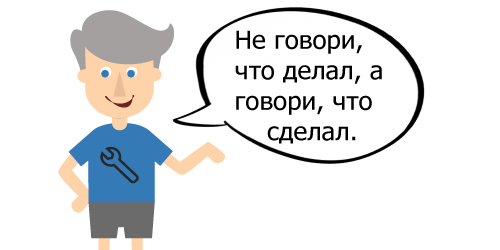
Russian course
Basic Russian for beginners
Lesson 11:
Don't say what you were doing, but say what you did.
In this lesson you will learn:
- the verbal aspect: imperfective and perfective verbs in Russian

Useful phrase in Russian
Listen and repeat the following sentence:
Не говори́, что де́лал, а говори́, что сде́лал
nye ga-va-rí, shto dyé-lal, a ga-va-rí, shto sdyé-lal
Don't say what you were doing, but say what you did (Russian saying)
Pay attention to this lesson: You will learn something very important, the verbal aspect. We can define it like this:
In Russian there are two kinds of verbs:
- verbs which mean "to be doing something" (imperfective verbs)
- verbs which mean "to have done something / to have finished doing something" (perfective verbs)
The concept of "verbal aspect" is not studied in English, that's why it is something new for you. But today you'll learn it!

Russian vocabulary
Read, listen and repeat the basic vocabulary of this lesson:
English
Russian
to be tired
уста́л (masc.) / уста́ла (fem.)
all, every, everything
весь (mas.) / вся (fem.) / всё (neuter)
novel
рома́н
dinner
у́жин
име́йл
home / at home
дом / до́ма
favourite
любимый
yummy, delicious
вку́сный
what a pity!
жаль!
long, for a long time
до́лго
usually
обы́чно
while
пока́
about
про
In this lesson you will learn that Russian verbs are presented in couples.
Each couple of Russian verbs has (usually) only one English equivalent.
In the grammar section, at the end of this lesson, you have an explanation on this topic.
English
Russian (imperfective verb / perfective verb)
to do
де́лать / сде́лать
to read
чита́ть / прочита́ть
to watch, to look
смотре́ть / посмотре́ть
to write
писа́ть / написа́ть
to like, to please
нра́виться / понра́виться
to think
ду́мать / поду́мать
to cook
гото́вить / пригото́вить

Dialogues in Russian
With extra help for verbs!
Now you are going to see a series of short dialogues which include perfective and imperfective. verbs. In the grammar section (after these dialogues) you will learn more about these verbs.
We are going to help you:
- Perfective verbs will be highlighted.
- Imperfective verbs will be highlighted.
Dialogue 1
English
Russian
How tired I am! Yesterday I was working the whole day.
Как я уста́ла! Вчера́ я рабо́тала весь день.
Good girl! Did you do everything?
Молоде́ц! Ты всё сде́лала?
No, I worked long, but I didn't finish to do everything.
Нет, я рабо́тала до́лго, но сде́лала не всё.
What a pity! And yesterday I didn't work. I was reading an interesting novel.
Жаль! А я вчера́ не рабо́тал. Я чита́л интере́сный рома́н.
Did you read it all?
Ты прочита́л его́?
No, I read the whole morning, but I haven't finished (reading) it.
Нет, я чита́л всё у́тро, но не прочита́л его́.
And what did you do the whole evening?
А что ты де́лал весь ве́чер?
I was watching television. And you know what? I watched your favourite movie.
Я смотре́л телеви́зор. И зна́ешь что? Я посмотре́л твой люби́мый фильм.
Very well!
О́чень хорошо́!
Dialogue 2
English
Russian
Were you yesterday in the cinema?
Вы бы́ли вчера́ в кино́?
No. We were home. I was writing an email for a long while.
Нет. Мы бы́ли до́ма. Я до́лго писа́ла име́йл.
But you wrote it all, right?
Но ты его́ написа́ла, да?
Yes, I finished (writing) it. It was a very important email.
Да, я его́ написа́ла. Э́то был о́чень ва́жный име́йл.
And what was Michael doing while you were writing the email?
А что де́лал Майкл, пока́ ты писа́ла име́йл?
He was cooking. Yesterday he cooked a very delicious dinner.
Он гото́вил. Вчера́ он пригото́вил о́чень вку́сный у́жин.
Dialogue 3
English
Russian
What are you doing?
Что ты де́лаешь?
I'm thinking about the new movie. Usually I like comedies, but I didn't like this movie.
Я ду́маю про но́вый фильм. Обы́чно мне нра́вятся коме́дии, но э́тот фильм мне не понра́вился.
I actually liked it. I usually like interesting movies. I watched it yesterday and tought that this is a good movie.
А мне понра́вился. Мне нра́вятся интере́сные фи́льмы. Я посмотре́л его́ вчера́ и поду́мал, что э́то хоро́ший фильм.
Oh, I thought that you didn't like comedies either.
А я ду́мала, что тебе́ то́же не нра́вятся коме́дии.
Usually they don't please me, but this movie pleased me.
Обы́чно они́ мне не нра́вятся, но э́тот фильм мне понра́вился.
Do you want to learn Russian with the best courses and books?
We recommend you the best Russian course, with 150 videos and personal tutor.
If you love reading, have a look at these books with stories in easy Russian with audio.
If you want to practice your Russian, here you can find exercise books, with key and grammar tables.

Russian grammar
Read the following grammar explanations for this lesson:
The aspect: imperfective and perfective verbs
WHAT IS THE "VERBAL ASPECT"?
In this lesson we have seen something VERY IMPORTANT regarding Russian, which we will now explain in a way that is easy to understand:
In English we can talk about imperfect actions (ongoing or not finished actions) and perfect actions (=finished actions):
- Imperfect actions: Yesterday Anna was reading when I came home. This morning I was cooking when you called me.
- Perfect actions: Yesterday Anna read a book. This morning I have cooked soup.
The "verbal aspect" is this comparison between "what is finished" and "what is happening". Thus, we will have:
- Imperfective aspect: when we express an imperfective (non-finished) action.
- Perfective aspect: when we express a perfect (finished) action.
What is an imperfective verb? and a perfective verb?
In English, the same verb ("to cook") is used to express both an ongoing action (I was cooking, I have been cooking) or a finished action (I cooked, I have cooked). That is why, when learning English, we don't talk about "verbal aspect".
In Russian, the contrast between imperfect and perfect is expressed with two different verbs:
- The imperfective verbs are those which only express imperfect actions (= ongoing and unfinished actions).
- The perfective verbs are those which only express perfect actions (= finished actions).
That is why, when learning Russian we MUST take into account the concept of "verbal aspect".
EXAMPLES:
- Imperfective: Гото́вить / Чита́ть = to cook / to read (when we talk about and ongoing/unfinished action).
- Perfective: Пригото́вить / Прочита́ть = to cook / to read (when we talk about an already finished action).
When you learn a new verb, try to memorize the pair imperfective / perfective. In the vocabulary section, at the beginning of this lesson, we show you some pairs of verbs, so you start getting used to this way of learning them.
When do we use an imperfective verb?
- To explain what we usually do, repeated actions, habits, etc...
- ...in the present
- Я чита́ю ка́ждый день / Он гото́вит о́чень хорошо́ / Мы смо́трим то́лько ру́сские фи́льмы
- I read every day / He cooks very well / We only watch Russian movies
- ...or in the past
- Ра́ньше я чита́л ка́ждый день / Когда́ я жил в Росси́и, я ча́сто гото́вил суп.
- Before I used to read every day / When I was living in Russia, I would often cook soup.
- To explain a process while it's happening...
- ...in the present (what are we doing?)
- Я читаю (I am reading) - Он делает что-то (He is doing something) - Мы готовим ужин (We are cooking dinner)
- ...or in the past: (what were we doing?)
- Я смотре́л телеви́зор, когда́... (I was watching tv, when...) Вчера́ я чита́л рома́н (yesterday I was reading a novel).
When do we use a perfective verb?
To explain a finished action (in Russian it is always in the past)
- Я прочита́л рома́н = I have read the novel / I finished (reading) the novel.
- Он пригото́вил у́жин = He has cooked dinner / He finished cooking dinner.
Perfective verbs don't exist in the present: when you finish something, that is already the past (even if only one second in the past).
NOTE: The future of perfective and imperfective verbs will be studied in lesson 13 of this course.

Test
Check how much you have learnt in this lesson:
This Russian course will always be free. Please, share it
When you share our website, you're helping us continue with our project: developing free Russian courses for everyone. Please, invest some seconds of your time in sharing us. Thank you.
|
Contact us Site map Terms of use Privacy policy Shop - Russian school Copyright © www.russianforfree.com All rights reserved. |


